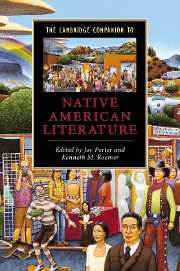Book contents
- Frontmatter
- Introduction
- Timeline
- Part I Historical and cultural contexts
- Part II Genre contexts
- Part III Individual authors
- 10 N. Scott Momaday
- 11 Simon Ortiz
- 12 James Welch
- 13 Leslie Marmon Silko
- 14 Gerald Vizenor
- 15 Louise Erdrich’s storied universe
- 16 Joy Harjo’s poetry
- 17 Sherman Alexie
- Bio-bibliographies
- Further reading
- Index
- Series List
16 - Joy Harjo’s poetry
from Part III - Individual authors
Published online by Cambridge University Press: 28 May 2006
- Frontmatter
- Introduction
- Timeline
- Part I Historical and cultural contexts
- Part II Genre contexts
- Part III Individual authors
- 10 N. Scott Momaday
- 11 Simon Ortiz
- 12 James Welch
- 13 Leslie Marmon Silko
- 14 Gerald Vizenor
- 15 Louise Erdrich’s storied universe
- 16 Joy Harjo’s poetry
- 17 Sherman Alexie
- Bio-bibliographies
- Further reading
- Index
- Series List
Summary
Joy Harjo assigns a central role to the power of the word - the mythic embodiment and memory of the Native American world - in shaping the remarkable quality of her writing as a living testimony: without evoking folkloristic elements, her work gives life to characters, stories, beliefs of Indian identity; without pompous statements of intent, she gives force to a political vision; without censorious overtones she gives voice to the passions.
Just as her own position is constantly intertwined with the historical path charted by her own tribe, so the urban cityscape also becomes contiguous with the natural landscape and the dialogue of love and thought becomes continuous with the myths of tradition. Thus, far from evoking a world of picturesque Indians or reminiscences of an ethnographic museum, she offers a serene and strong assertion of a complex personal identity, without reticence, but also without exaggerated emphasis on her roots or lifestyle choices.
Born in Tulsa, Oklahoma, in 1951 to a Creek father (the Creek are also known as the Muscogee) and a Cherokee / French mother, Harjo’s paternal ancestors feature valiant warriors such as the Menawa Chief who led the “Red Stick War” against General Andrew Jackson in the early 1800s. As she herself mentions in several interviews, during her childhood and adolescence, she felt considerably closer to her father’s family than her mother’s. She looked to her grandmother Naomi and her great-aunt Lois, both of whom were artists, as role models of emancipated women and precious sources of transmission of a treasured cultural heritage. After a painful family conflict arising from her parents’ divorce, at a very early age, she sought refuge in the Southwest, which would play such a crucial role in her cultural development. She enrolled in the Institute of American Indian Arts (IAIA) in Santa Fe, New Mexico, determined to embark on a career in art and painting. This was a period of growing up and becoming more mature, but also a deeply disordered period. Harjo did succeed in completing the course and obtaining her diploma in 1968.
- Type
- Chapter
- Information
- The Cambridge Companion to Native American Literature , pp. 283 - 296Publisher: Cambridge University PressPrint publication year: 2005
- 1
- Cited by



